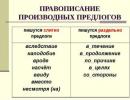Despite the fact that this. Although. Derivative prepositions: rules in Russian
“Despite” in its most common form (as a preposition) is written in two words.
Semantics
- Means “not paying attention to anyone or anything.”
- Expresses concessionary relations.
- Used with the accusative case.
Continuous writing
The spelling of this combination depends on which part of speech is in front of us. Let's look at examples:
- Despite the weather, we had a great walk.
- If two hearts are meant to meet, it will happen despite time and distance.
- They felt comfortable in each other's company, despite the long separation.
In all three cases, we are dealing with a preposition in which the word “despite” is correctly written together.
In order to make sure that you have a preposition, try replacing it with the following words:
- without considering
- contrary to
- in defiance
Was the replacement successful? Then there is no doubt!
Separate writing
Is it possible to write “despite”? Quite, if “despite” is a gerund. We think you know the rule about writing the particle “not” separately with this part of speech. It works in our case too. See examples:
- He silently left the audience , even without looking at her.
- Regardless of anyone, the girl ran out of the room.
In the above sentence, “despite” answers the question “by doing what?” A synonym is the combination “without looking.”
Recognize the preposition (2 words)
Let us formulate the basic principles:
- The meaning of concession.
- It has a permanent form, that is, the prefix “not” cannot be omitted.
- It is impossible to ask a question, since the functional parts of speech do not have questions.
- Cannot be replaced by a verb.
Well, don’t forget that this preposition is written together with “not”.
How to recognize participles (3 words)
Here are the main points to pay attention to:
- If you omit "not", the meaning will change to the opposite.
- It usually contains nouns or pronouns with the prepositions “with”, “on”, “by”.
- Since there is an additional action, in a sentence you will certainly find a verb with the meaning of the main action.
- Synonymous with the combination “without looking.”
We write separately with a negative particle.
Punctuation
The phrases with the preposition we are studying are isolated.
- Despite her years, the lady looked amazing.
- A presentable, despite his short stature, middle-aged man entered the hall.
- The girl learned to live on, despite the pain of disappointment.
When a phrase is at the beginning of a sentence, a comma is placed after it, at the end - before it, in the middle - commas on both sides.
Synonyms
The preposition “despite” can be replaced with synonyms:
- contrary to;
- against;
- though;
- contrary to;
- contrary to;
- across;
- out of spite;
- Although;
- regardless of.
Of course, do not forget to pay attention to the context and appropriateness of using synonyms in a particular style of speech.
Antonyms
We will not consider all antonyms; we will present only the most obvious one - the word “thanks to”.
What do the English say?
But I’m curious, how does our preposition sound in English?
"Despite"
First of all, it is worth understanding the unspoken rule: if for us “despite” is two words, then for the British it will be a combination of one or three (but not two) words.
So, let's remember:
- In English, this preposition sounds like despite (without of!) or in spite of.
- It is followed by either a noun or a gerund.
- You can say a whole sentence, but be sure to add the phrase the fact that immediately after the preposition.
Here are some examples:
- He is hungry in spite of eating three big hamburgers. He is hungry even though he ate three big hamburgers.
- She has a good mood despite the bad weather. – She is in a good mood, despite the bad weather.
- Mary likes the dogs despite the fact that the dogs don’t like her. – Mary loves dogs, even though dogs don’t like her.
- I want to be a singer in spite of the fact that I don’t have a voice. – I want to be a singer, despite the fact that I don’t have a voice.
"Although"
There is a word in English, although, which translates as “although.” Try not to confuse it with despite, otherwise the result will be grammatical nonsense.
The word although has two synonyms – though and even though. It would seem, what is the difference? Though is simply used less often than although. And even though emphasizes surprise at the fact.
Let's look at examples:
- He drank my coffee although it was cold. – He drank my coffee, although it was cold.
- Though all my friends like orange juice, I can’t stand it. Although all my friends love orange juice, I can’t stand it.
- Even though 10 men proposed to her, she is still single. – Although she has been proposed to 10 times, she is still single.
So now you know how to spell “despite.” Despite the apparent ease of the rule, try not to confuse the preposition with the gerund.
Although
union
Syntactic constructions beginning with the conjunction “despite the fact that” are distinguished by punctuation marks. In this case, the first punctuation mark can be placed either before a compound conjunction or between its parts (before the word “what”). For factors influencing the placement of punctuation marks, see Appendix 3. ()
The viewer was supposed to believe that in front of him was a person who remained unharmed, despite currents of extraordinary strength pass through it. Y. Olesha, Spectacles. Despite, Yagozin was the brainchild of St. Petersburg, from the day he was born he breathed the air of Nevsky Prospekt and sucked the milk of the Okhten nurse; nevertheless, he was all about speed and agility. D. Grigorovich, Careerist. We started running along the edge of the shore itself, and everything turned out great, despite Here and there the ice broke and water came out. D. Mamin-Sibiryak, Bad Comrade. He, despite the fact I was in the intoxicating haze of beer and wine, and felt that it was somewhat indecent to be in the presence of an outside witness in such a form and with such an action. N. Gogol, Nevsky Prospekt.
@ In fiction there are examples of placing a comma both before the word “despite” and before the word “what”: The horse was starting to get tired, and he was dripping with sweat., despite, He was constantly waist-deep in snow. A. Pushkin, Blizzard. The botanical garden was managed by an excellent scientific director and did not allow any disorder, despite, He spent most of his time studying with a microscope in a special glass booth located in the main greenhouse. V. Garshin, Attalea Princeps.
Dictionary-reference book on punctuation. - M.: Reference and information Internet portal GRAMOTA.RU. V. V. Svintsov, V. M. Pakhomov, I. V. Filatova. 2010 .
Books
- What do women's gestures conceal? Luxurious woman (number of volumes: 2), Kudryashov Nikolai Ivanovich. “What do women’s gestures conceal?” How can a man understand that a woman likes him? How can a girl attract a guy? What gestures during communication can win over and not repel the interlocutor? About... Buy for 850 RUR
- What's wrong with me? Symptoms of illnesses and family constellation, Kuchera Ilze. What's wrong with me? 187; - many patients want to know, who, despite endless visits to doctors, are not getting better. Surprisingly, it turns out that behind the symptoms...
The Russian language is rightfully considered difficult to learn, because where else can you see such a variety of spelling norms, rules and exceptions? And for foreigners, the most difficult topic is prepositions. In fact, the spelling rules are quite simple, you just need to remember which ones are written together or separately, and which ones are written with a hyphen.
The problem arises later when a homonymous part of speech (for example, a noun with a preposition) is placed next to it, the spelling of which is radically different. The most striking example of such a “neighborhood” is the preposition “despite” and the homonymous gerund “despite”. Let's figure out when a turn is written together and when separately.
Spelling of the preposition “despite”
Preposition "despite" used in the meaning of concession. It can be replaced with the following synonyms: “despite”, “contrary”, “not taking into account”. Accordingly, the simplest way to help determine whether it is a preposition is to mentally replace the phrase with any other equivalent. For example:
- Despite the rain, I went for a walk with the dog.
- In spite of the rain I went for a walk with the dog.
You can also try asking a question about this phrase. In Russian, prepositions are auxiliary parts of speech, which means it will be impossible to ask them a question. For example:
- Despite ( for what?) no matter what they continued to go towards their goal.
- Despite ( for what?) in bad weather the animals asked to go outside.
And also a sure sign that the phrase in front of us is a verbal preposition is its invariability. We cannot omit the prefix "not". For example:
- They felt comfortable with each other, despite the fact that they had not seen each other for so many years.
- They were comfortable with each other despite that that they haven't seen each other for so many years.
- She set aside a few minutes to talk, despite her workload.
- She took a few minutes to talk, looking at workload.
As you can see, when we omit the prefix, the whole meaning of the sentence is lost.
It is very important to remember that the phrase with the preposition “despite” always separated by commas. If it is at the beginning or end of a sentence, then the comma is placed on one side, if in the middle - on both sides.
Spelling the participle “in spite of”
The participle “in spite of” is used in its direct meaning, that is, literally “without looking at something.” Accordingly, it can be replaced in the sentence synonymous phrase “without looking”. For example:
- I typed the text of the report without looking at the screen.
- I typed the text of the report, not looking to the screen.
Since the gerund is not a functional part of speech, you can ask the question about it: “Doing what?” or “Having done what?”, thereby determining that this phrase is not a verbal preposition “despite.”
- I talked about my discovery, ( doing what?) despite the commission.
- Friends shared news among themselves, ( doing what?) despite the others.
The participle is also additional action to the main verb, therefore, there is one more way to distinguish it from a preposition. It is necessary to find the main verb and correlate it with the phrase. For example:

You can also omit the particle “not” from the participle - then the meaning of the sentence will be reversed. For example:
- The children ran around the yard without looking around.
- The children were running around the yard, depending on both sides.
The participle is always written separately with the negative particle “not” and is always separated by commas: if the phrase is at the beginning or end of the sentence, then it is separated by a comma on only one side, if in the middle - on both sides.
despite or despite
Together or separately?
Both spellings can be correct, because combined and separate spellings depend on the context.
The preposition “despite” has an unchanged form and is written together - despite
.
The participle “looking” with the negative particle “not” is written separately - despite
.
“Notwithstanding” rules
How to spell the word together “ despite” together or separately?
Word " despite” is a derived preposition, it comes from the particle “not”, the gerund “looking” and the preposition “on”.
The preposition “despite” is always written together.
It has a concessive meaning. A synonym for it can be the word “at least”. The word “despite” is also written together in the stable combination “despite everything.”
Examples
- But the joyful mood did not subside, despite fatigue.
- Despite the fact that Victor was the son of a factory director, he behaved evenly with everyone, without arrogance.
- Vika was too proud and did not forgive Alexei, despite the fact that the young man stood under her windows for several hours
“No matter” rules
Word " despite” is a combination of a negative particle and a gerund.
With gerunds, as well as with verbs, this particle is always written separately.
The participle always denotes an additional action, therefore it is used only in combination with some verb that has the meaning of the main action. The participle “not looking” can always be replaced by the synonym “not looking”; if such a replacement is possible, then the word “not looking” will be written separately. The participle “in spite of” can be used with both the preposition “on” and the preposition “in”.
Examples
Say all the examples out loud for better memorization.
- Asya answered quietly, despite on me.
- I even despite through the window, I knew that it was lightly raining outside.
- The boy frowned and despite to my eyes, he answered briefly that he knew nothing.
Learning Russian is not easy for everyone. It contains a variety of spelling norms, rules and exceptions. When writing the combination “despite that”, pay attention to what part of speech it is expressed. This can be a preposition or a homonymous gerund. It is important to understand in which cases the turnover is written separately, and in which together.
Derivative prepositions: rules in Russian
Prepositions in Russian are important. They indicate the dependence of nouns, pronouns and numerals on other words. This applies to sentences and phrases. A part of speech has no meaning of its own, so a preposition can only serve. When using it, it is important to know how to spell “despite that.” The correct use of a derived preposition involves various ways of placing it in a sentence.
Derivative prepositions are transferred from other parts of speech. At the same time, they lose their morphological characteristics: words are necessary to indicate dependence on other words, they cannot be declined by case, they do not have gender and number, they are not members of a sentence. When writing, take into account the rules of punctuation.
Spelling the combination “despite”

If you need to show that a person has given in, use the pretext “despite that.” Its synonyms are the words “despite”, “not taking into account”. You can determine the part of speech by making a substitution. Example: “Despite the fact that all the streets were covered with snow, the children were at every step.” Replace the preposition with the word “in spite of.” The result is a sentence: “Despite the snow that covered all the streets, the children were at every step.”
The test is carried out using a question. A preposition is a service part of speech, so a question cannot be asked. If after the question you can get an answer, then the word is another part of speech. To determine the writing rules, pay attention to the following points:
- The combined spelling with “not” indicates that the sentence contains a preposition: “Despite the fatigue, we quickly climbed to the top of the mountain.”
- Concessive meaning, when it can be replaced with the word “despite”: “Despite (despite) the offense, I spoke calmly.”
- The prefix “not” cannot be omitted. It is incorrect to use the word “depending on”.
- There is no replacement with another part of speech, for example, a verb.
The preposition “despite that” cannot be removed from the sentence, since its meaning is lost. If the prefix disappears during pronunciation, it will become unclear what the person wants to say. This can be seen in some sentences:
- They excitedly talked about their lives, despite the fact that they had not seen each other for ages. When changed to the word “looking” the meaning is lost.
- Vera decided to visit the establishment, despite the fact that she was sorely short of time.
The reverse is not always separated by commas. To place punctuation marks correctly, you need to pay attention to the placement of the preposition. It can appear at the beginning or end of a sentence, so it is separated by commas on one or both sides.
Punctuation under circumstances

Sentences often use adverbial members that contain derivative prepositions. Among them: thanks to, despite, as a result of, like. Isolation occurs to emphasize the meaning of what is being said. Example: “Despite the fact that there were many curious people on the street, the village seemed deserted and silent. He decided to go to training, despite the fact that the doctors forbade it.”
When using the preposition “despite the fact that,” a comma is not used if it comes immediately after the verb. Punctuation is only required before the word "what". Differences in punctuation depend on word order. Example: “He looked despite the fact that his eyes hurt a lot.”
Writing a derived preposition
The part of speech helps make the sentence colorful and indicates that the action was performed in spite of something. Among the features are the following writing rules:
- Derivative prepositions consist of one or more words.
- You need to remember the spelling, you can check it in a spelling dictionary.
- When used, one preposition is replaced by another synonymous one.

The preposition “despite” is formed from the gerund. When writing, take into account the possibility of opposition. The particle “not” has become a prefix. Unlike the gerund, it is written together with a preposition. It is separated by commas, just like the participial phrase.






